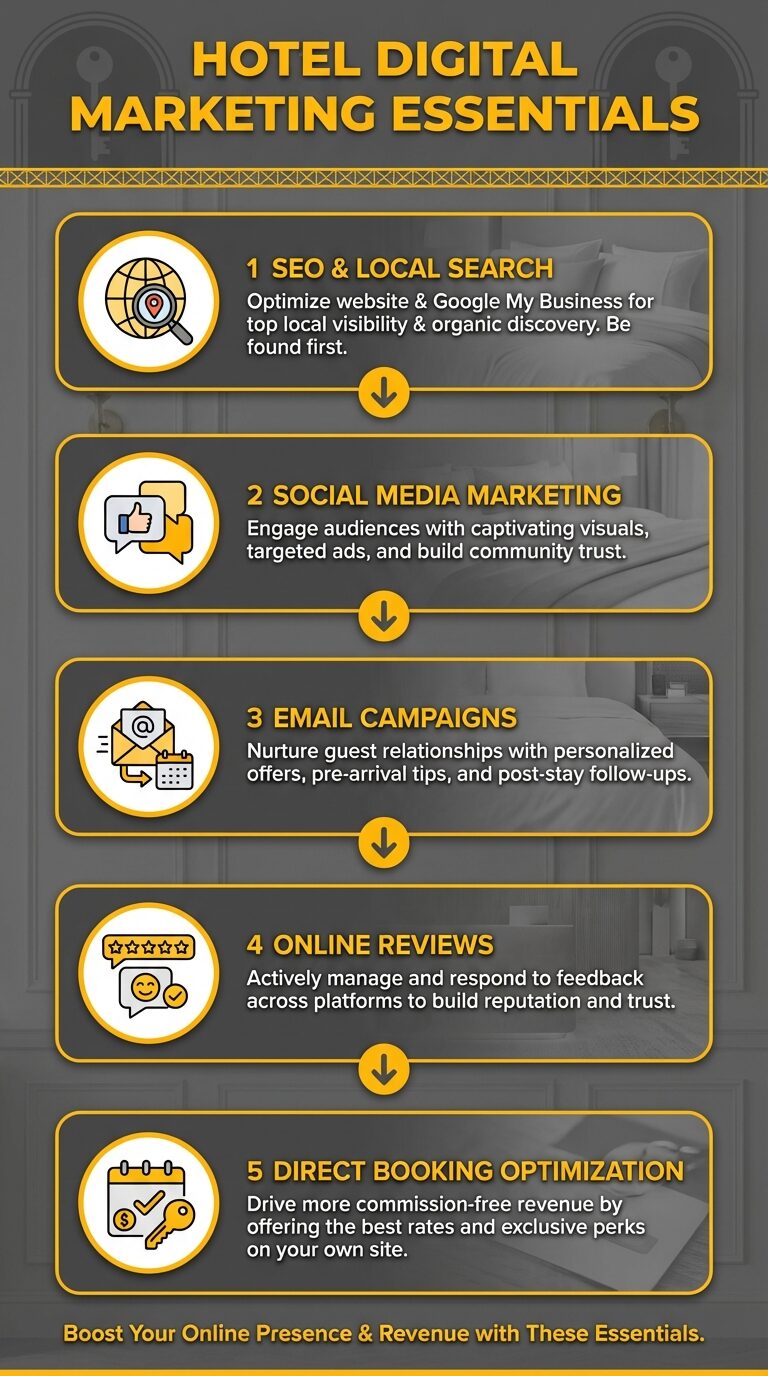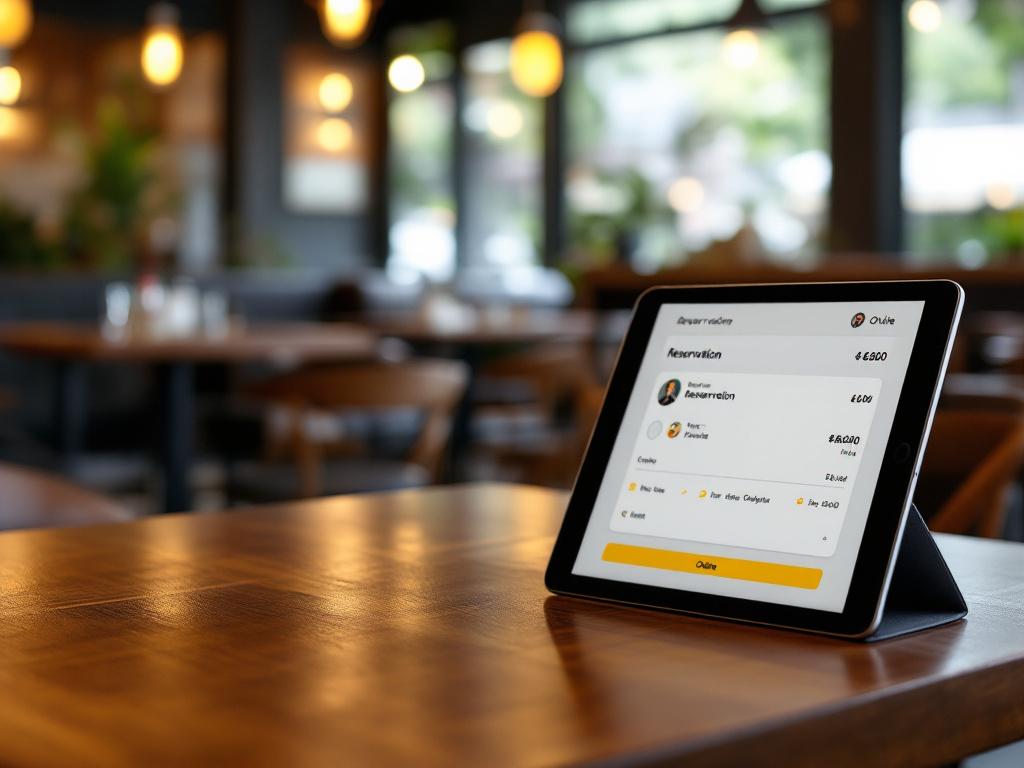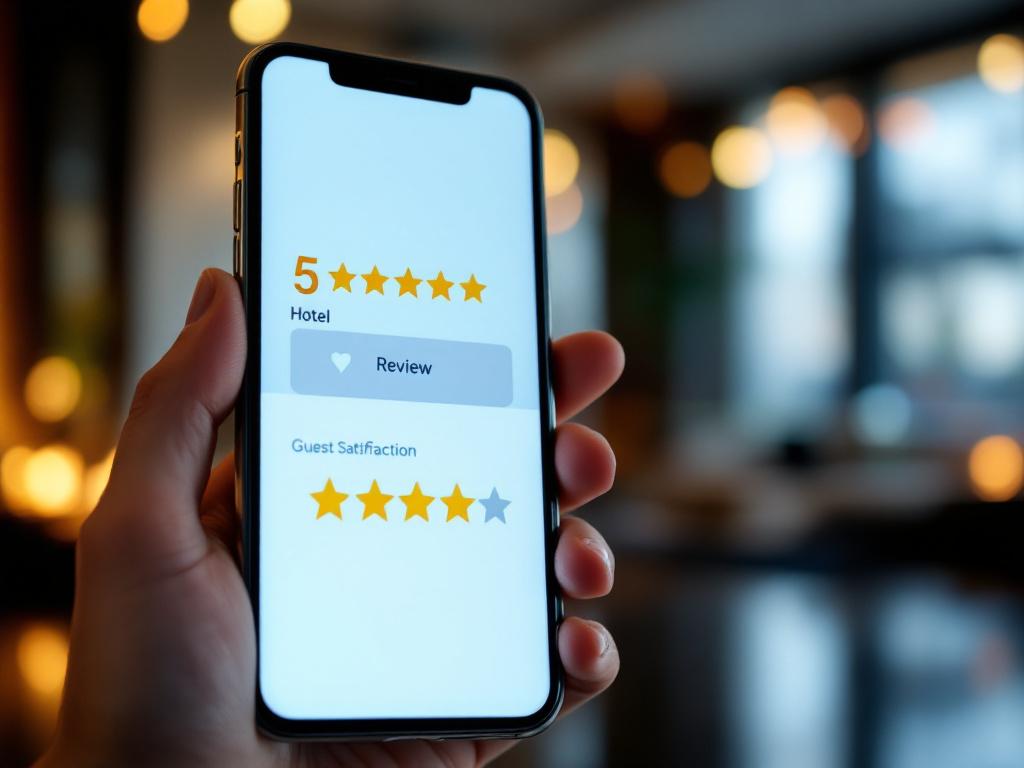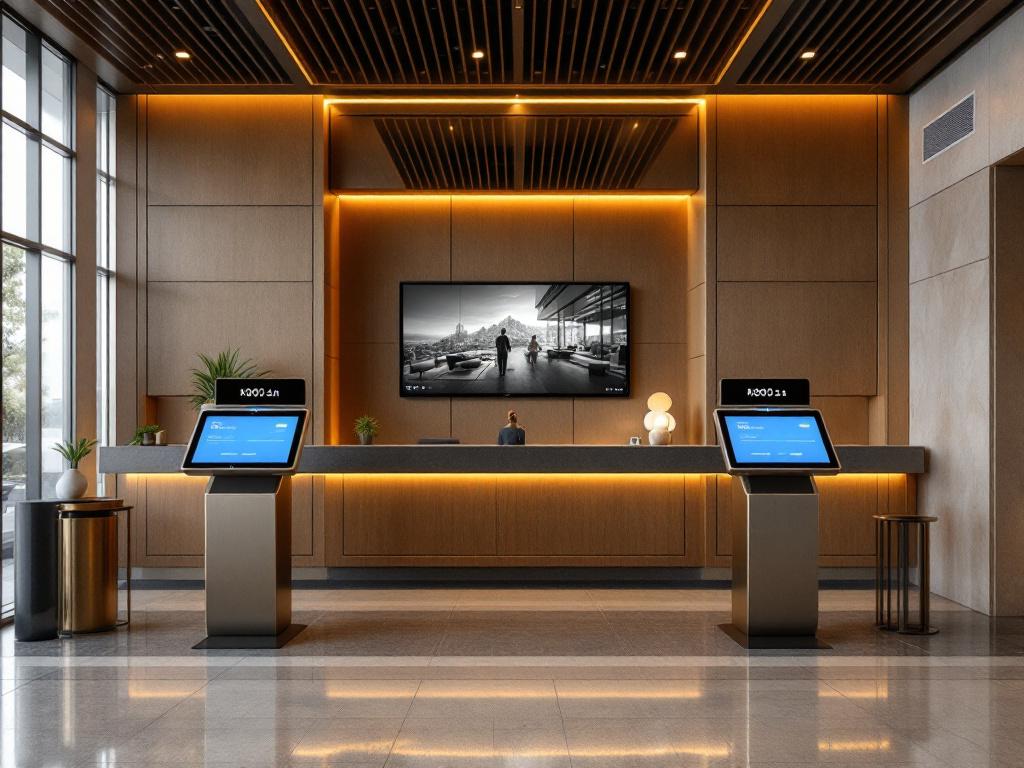The hospitality industry has transformed since the pandemic. Hotels, restaurants, and tourism businesses face new challenges—and new opportunities—in 2026. Digital marketing and SEO have become essential tools for attracting guests in an increasingly competitive market.
In this guide, we cover proven SEO and marketing strategies specifically for hospitality businesses looking to boost visibility, bookings, and revenue.

Why Digital Marketing Matters for Hospitality in 2026
Travel planning has changed fundamentally. Guests now research extensively online before booking, comparing options across multiple platforms. Your digital presence directly impacts your bottom line.
- Over 80% of travellers research online before booking
- AI-powered search is changing how travellers discover accommodation
- Direct bookings save significant commission costs versus OTAs
- Online reviews directly influence booking decisions
- Social media drives discovery for younger travellers
Without a strong digital presence, you’re invisible to the majority of potential guests. That’s revenue walking straight to your competitors.
SEO Strategies for Hotels and Accommodation
Search engine optimisation helps your property appear when potential guests search for accommodation in your area. Here’s how to optimise effectively:
Target the Right Keywords
Focus on keywords that indicate booking intent:
- Location + accommodation type: “boutique hotel Sydney CBD,” “beachfront resort Gold Coast”
- Experience-based: “romantic getaway Melbourne,” “family-friendly resort Queensland”
- Near attractions: “hotel near Sydney Opera House,” “accommodation near Great Barrier Reef”
- Amenity-focused: “hotel with pool Brisbane,” “pet-friendly accommodation Perth”
Use keyword research tools to find terms your target guests actually search for. Volume matters, but relevance matters more.
Optimise Your Website Structure
Your website architecture affects both user experience and search rankings:
- Create dedicated pages for each room type with unique descriptions
- Build location pages targeting “hotels in [suburb/area]” searches
- Add an experiences or activities section highlighting local attractions
- Ensure mobile responsiveness—most travel searches happen on phones
- Improve page speed to reduce bounce rates
A well-structured website helps search engines understand your offerings and helps guests find what they need quickly.

Local SEO for Hospitality
Local SEO is critical for hospitality businesses. When someone searches “hotels near me” or “restaurants in [city],” you want to appear.
- Google Business Profile: Claim and fully optimise your listing with photos, hours, amenities, and regular updates
- Local citations: Ensure consistent NAP (name, address, phone) across directories
- Location schema markup: Help search engines understand your physical location
- Local content: Create guides about your area, nearby attractions, and local events
Local search drives high-intent traffic. Someone searching “hotel near Sydney airport” is likely booking today.
Content Marketing for Hospitality
Content builds authority and attracts organic traffic. For hospitality businesses, content should inspire and inform potential guests.
Blog Topics That Drive Traffic
- Local area guides and hidden gems
- Seasonal events and festivals coverage
- Travel tips for your destination
- Behind-the-scenes looks at your property
- Guest stories and experiences
- Food and dining recommendations
Effective content marketing positions your property as the local expert. When guests trust your recommendations, they’re more likely to book with you.
Visual Content is Essential
Hospitality is visual. Invest in professional photography and video:
- High-quality room and property photos
- Virtual tours showing the guest experience
- Video content for social media
- User-generated content from guests
- Seasonal photography showing your property year-round
Poor imagery kills conversions. Guests judge properties by photos before reading a single word.
Social Media Marketing for Hotels and Restaurants
Social media drives discovery and engagement for hospitality brands. Different platforms serve different purposes.
Instagram and TikTok
Visual platforms are perfect for showcasing properties and experiences:
- Post stunning property photos and videos
- Share behind-the-scenes content
- Feature guest experiences and user-generated content
- Use location tags and relevant hashtags
- Partner with travel influencers
Younger travellers often discover accommodation through social media before searching Google.
Facebook for Community and Ads
Facebook advertising offers powerful targeting for hospitality:
- Target users planning trips to your destination
- Retarget website visitors who didn’t book
- Promote special offers and packages
- Build community through your page
- Share events and local happenings

Online Reputation Management
Reviews make or break hospitality businesses. A single star rating difference can significantly impact booking rates.
Managing Reviews Effectively
- Respond to every review: Thank positive reviewers and address negative feedback professionally
- Encourage reviews: Ask satisfied guests to share their experience
- Monitor multiple platforms: Google, TripAdvisor, Booking.com, and industry-specific sites
- Learn from feedback: Use reviews to identify and fix operational issues
- Showcase testimonials: Feature positive reviews on your website and social media

Reputation management isn’t about hiding negative reviews—it’s about demonstrating you care about guest experience.
Direct Booking Optimisation
OTA commissions eat into margins. Driving direct bookings improves profitability significantly.
Why Direct Bookings Matter
- Save 15-25% in OTA commission fees
- Own the guest relationship and data
- Opportunity to upsell and cross-sell
- Build loyalty program membership
- Better control over pricing and inventory
Strategies to Drive Direct Bookings
- Best rate guarantee: Match or beat OTA prices on your website
- Exclusive perks: Offer benefits for booking direct (free breakfast, late checkout)
- Simple booking process: Reduce friction in your booking engine
- Retargeting campaigns: Reach users who visited but didn’t book
- Email marketing: Nurture past guests and enquiries
A strong SEO strategy combined with direct booking incentives shifts revenue from OTAs to your own channels.
Email Marketing for Hospitality
Email remains one of the highest-ROI marketing channels for hospitality businesses.
Email Campaign Types
- Pre-arrival: Build excitement and upsell experiences
- Post-stay: Request reviews and encourage return visits
- Seasonal promotions: Fill low-occupancy periods
- Loyalty communications: Reward repeat guests
- Newsletters: Share local events and property updates
Segment your list by guest type, visit history, and preferences for more relevant messaging.
Paid Advertising for Hospitality
Strategic paid advertising accelerates results when organic growth isn’t enough.
Google Ads for Hotels
- Bid on branded terms to protect against competitor ads
- Target high-intent keywords like “book hotel [location]”
- Use hotel-specific ad formats
- Implement conversion tracking for bookings
Combine Google Ads with SEO for maximum search visibility.
Social Media Advertising
- Target users interested in travel to your destination
- Create lookalike audiences from past guests
- Promote special offers with compelling creative
- Use video ads to showcase the experience
Measuring Success
Track the metrics that matter for hospitality marketing:
- Direct booking revenue: Your primary conversion goal
- Website traffic: Especially organic and referral
- Booking engine conversion rate: How many visitors book
- Cost per acquisition: What you spend to get each booking
- Review scores: Across all major platforms
- Social engagement: Reach and interaction rates
Regular reporting helps you understand what’s working and where to invest more.
Getting Started
Digital marketing for hospitality requires a multi-channel approach. Start by:
- Auditing your current digital presence
- Optimising your Google Business Profile
- Improving website speed and mobile experience
- Creating a content calendar
- Setting up proper tracking and analytics
Need help building a comprehensive digital marketing strategy for your hospitality business? Our team specialises in SEO services and digital marketing for hotels, restaurants, and tourism operators across the country.
]]>AI and the Future of Hospitality Marketing
Artificial intelligence is reshaping how travellers discover and book accommodation. Understanding these changes helps you stay ahead.
AI Search and Discovery
AI-powered search tools like ChatGPT and Google’s AI Overviews are changing how people research travel. Instead of browsing ten tabs, travellers ask AI for recommendations. To appear in these AI-generated results:
- Create comprehensive, authoritative content about your property and area
- Ensure your information is accurate and consistent across the web
- Build genuine reviews and mentions on trusted platforms
- Focus on answering specific questions travellers ask
AI Tools for Hospitality Marketing
AI can streamline your marketing operations:
- Chatbots: Handle booking enquiries 24/7
- Dynamic pricing: Optimise rates based on demand
- Content generation: Assist with descriptions and social posts
- Personalisation: Tailor offers to guest preferences
- Analytics: Identify trends and opportunities
Use AI as a tool to enhance efficiency, but maintain the human touch that hospitality requires.
Common Mistakes to Avoid
Many hospitality businesses make these digital marketing mistakes:
- Ignoring mobile: Most travel searches happen on phones—your site must work perfectly on mobile
- Poor photography: Low-quality images kill conversions instantly
- Inconsistent information: Different hours, prices, or details across platforms confuse guests and hurt SEO
- Neglecting reviews: Unanswered negative reviews damage your reputation
- Over-relying on OTAs: Building no direct channel leaves you vulnerable to commission increases
- No tracking: Without proper analytics, you can’t optimise what you can’t measure
Seasonal Marketing Strategies
Hospitality demand fluctuates seasonally. Smart marketing addresses this:
- Peak season: Focus on maximising revenue and capturing demand
- Shoulder season: Target flexible travellers with value offers
- Low season: Promote alternative reasons to visit (events, business travel, local staycations)
Plan your content and campaigns months ahead to capture early bookers and build anticipation.
Partner With Hospitality Marketing Experts
Hospitality marketing is complex. Between managing operations and guest experience, most businesses don’t have time to master every digital channel. That’s where we come in.
Our team understands the unique challenges of hospitality marketing—from seasonal fluctuations to OTA competition. We build integrated strategies combining SEO, content, social media, and paid advertising to drive direct bookings and reduce acquisition costs.
Ready to boost your hospitality business online? Get in touch for a free consultation.
Whether you run a boutique hotel, a restaurant chain, or a tourism operation, the fundamentals of digital marketing remain the same: be visible where your guests search, provide value through your content, and make booking easy. The businesses that invest in these foundations today will capture the guests of tomorrow.
